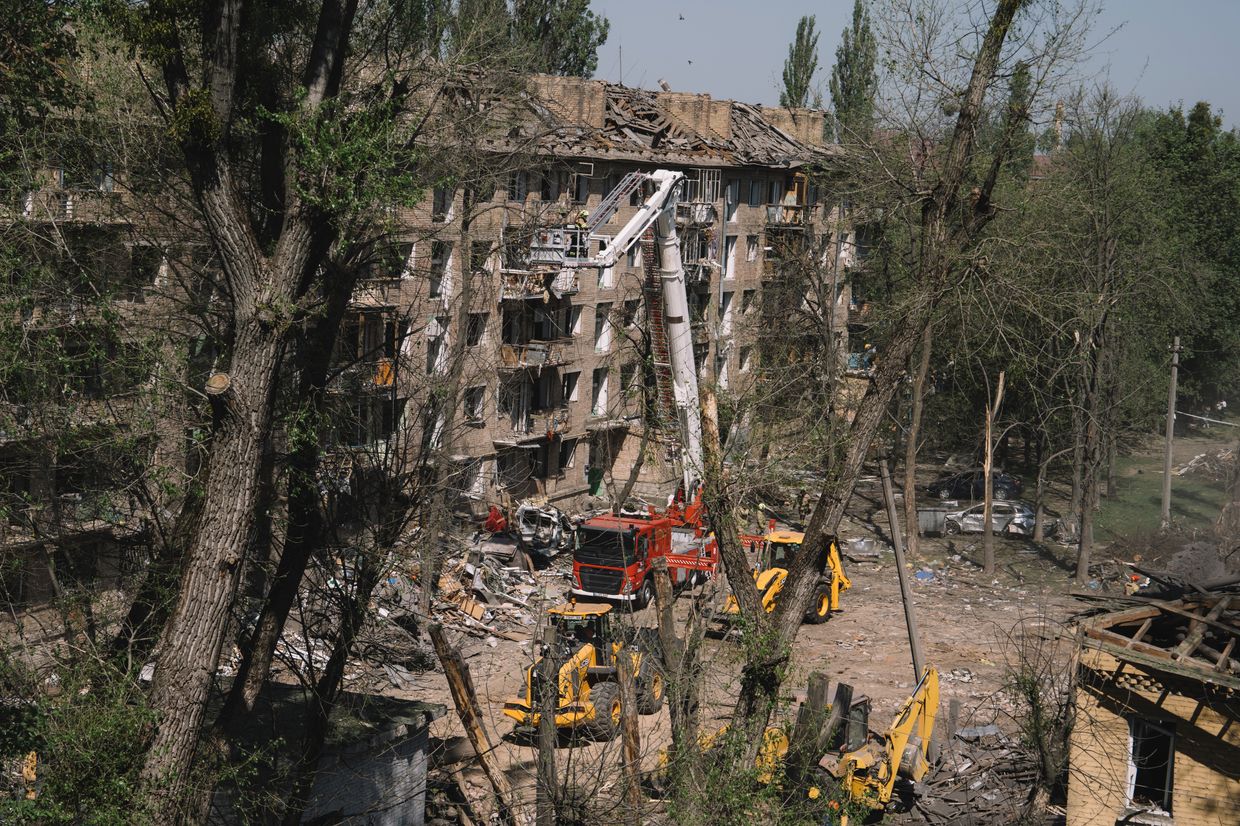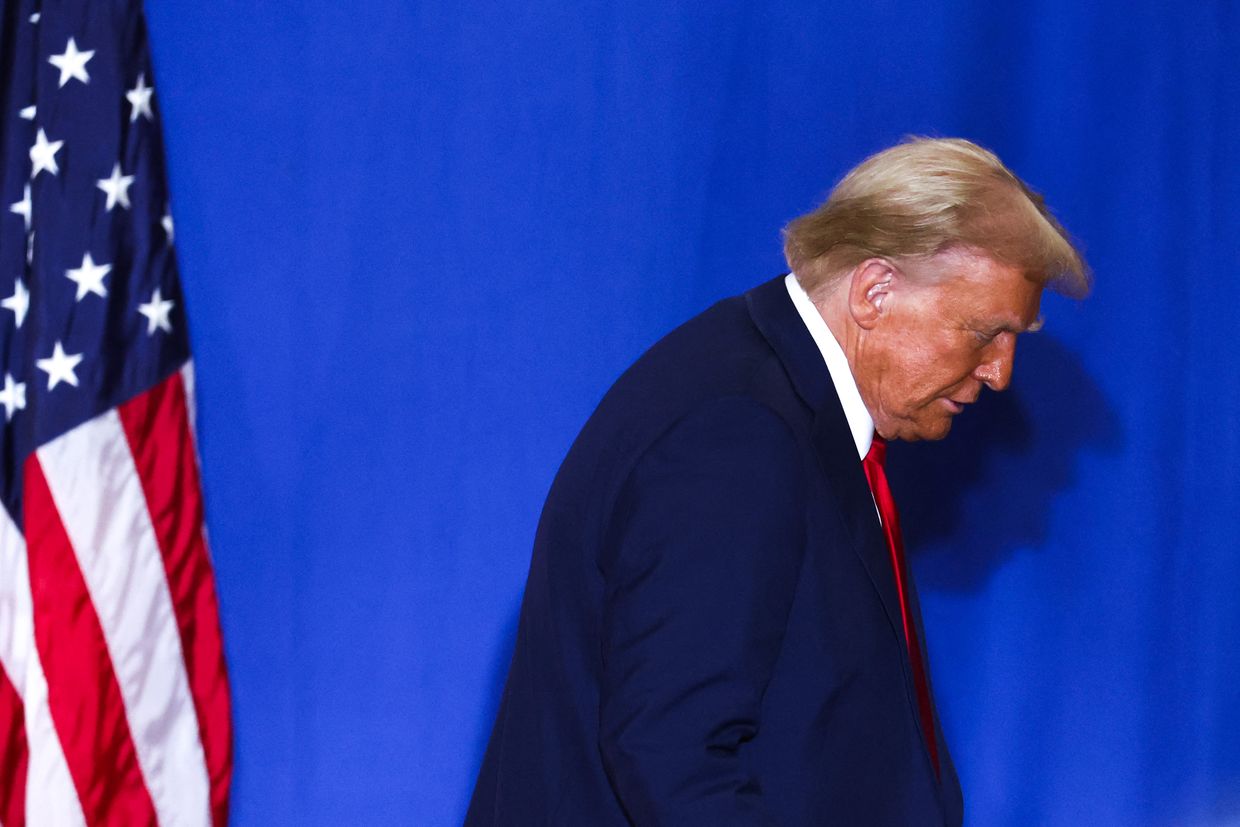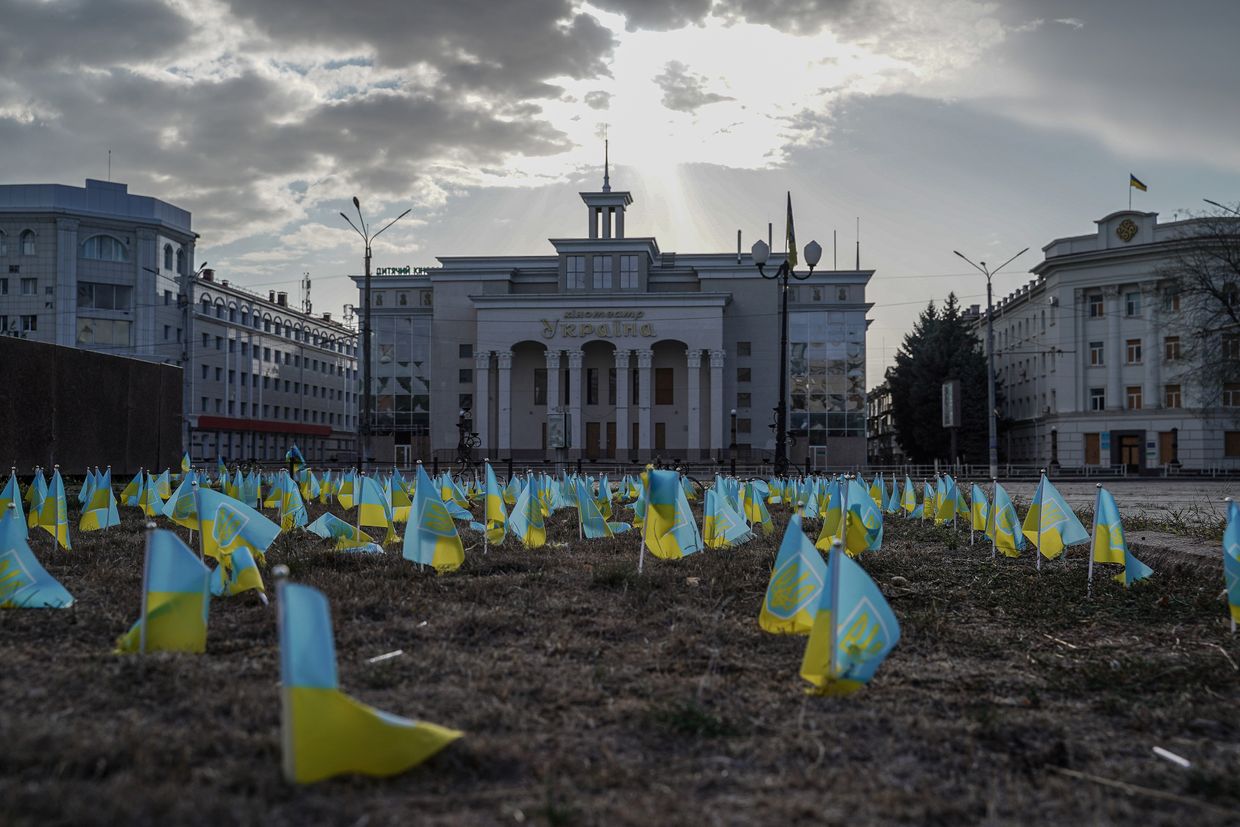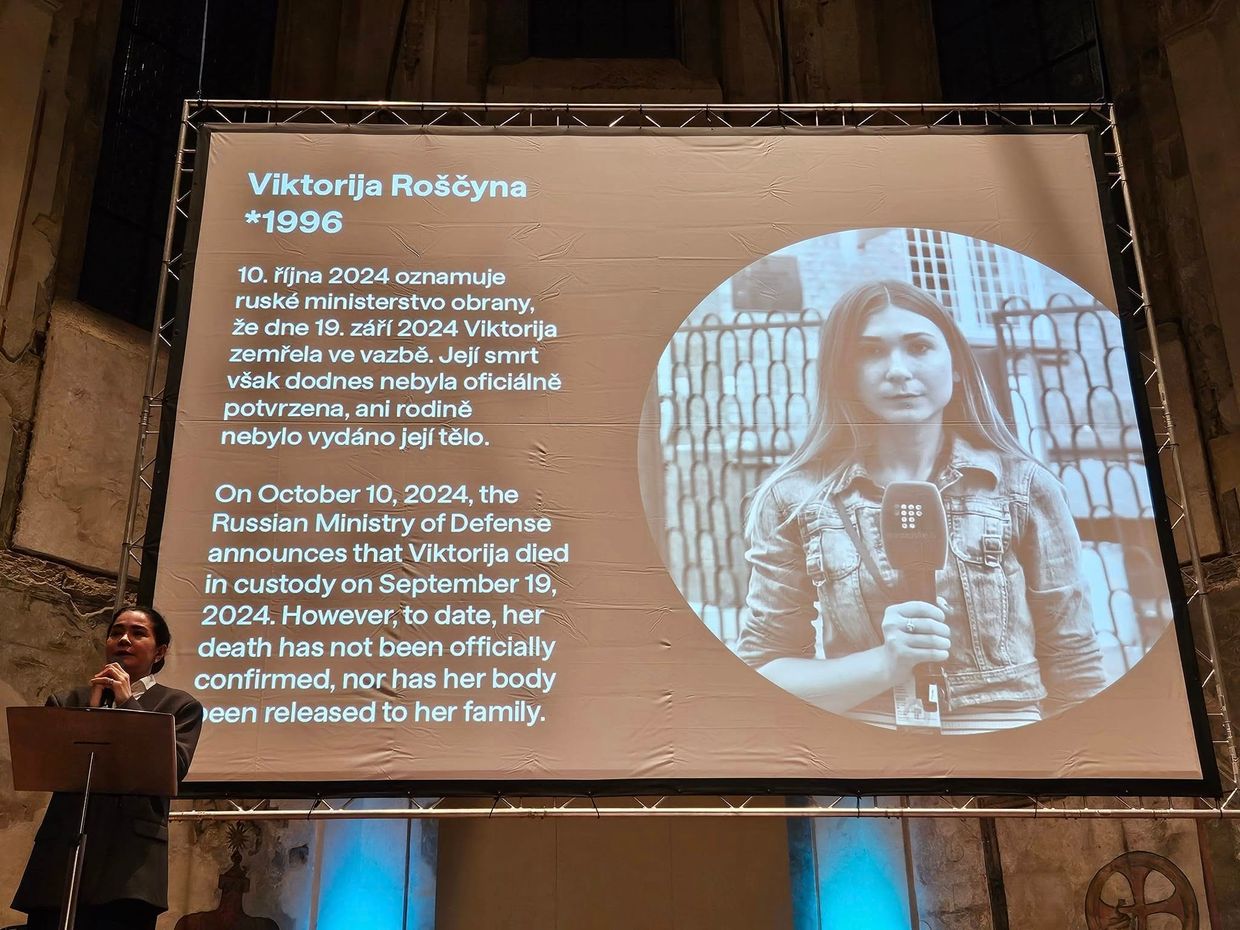Ukraine war latest: 'Russian peace in all its glory' — Russian missile attack on Kyiv kills 12, injures 90

Key developments on April 24:
- 'Russian peace in all its glory' — Mass Russian missile, drone attack on Kyiv kills 12, injures 90
- Europe rejects US push to recognize Russian occupation of Crimea, FT reports
- NATO chief to reportedly urge US not to force Russia-friendly deal on Ukraine
- US to demand Ukraine's right to maintain sufficient army in talks with Russia
- Ukraine brings back body of journalist Viktoriia Roshchyna tortured in Russian captivity, official says
Twelve people were killed and 90 civilians, including six children, were injured in a large-scale Russian missile and drone attack on Kyiv overnight on April 24, Ukraine's State Emergency Service said.
A series of explosions rocked the capital around 1:00 a.m. local time on April 24, Kyiv Independent journalists on the ground reported. Additional explosions were later heard around 4 a.m. local time.
Russia launched attack drones, as well as cruise and ballistic missiles, the Kyiv City Military Administration said.
"We were at home and there were explosions," Maria Rumiantseva, a 40-year-old resident of one of the buildings damaged in the attack, told the Kyiv Independent.
"Then I heard the Shahed. We just went out into the corridor, went to open the door, and that was it — an explosion."
Kyiv Mayor Vitali Klitschko said that six children, as well as a pregnant woman, were among the injured. Ukraine's State Emergency Service said that at least two children are not accounted for.
Fires were reported in residential buildings, Kyiv City Military Administration chief Tymur Tkachenko said, adding that cars and commercial buildings have been impacted as well.
Fallen debris was found around the city, Tkachenko added, describing the attack as "Russian peace in all its glory."
The mass attack came just hours after the Kremlin demanded Ukraine's full recognition of Russia’s claim over four Ukrainian oblasts it partially occupies, neutral status for Ukraine, and an end to all Western military support.
Earlier on April 23, U.S. President Donald Trump suggested that President Volodymyr Zelensky was the main obstacle to peace in Ukraine.
Later in the night, Russia launched missiles targeting various regions of the country.
Zhytomyr, Dnipropetrovsk, Kharkiv, Poltava, Khmelnytskyi, Sumy, and Zaporizhzhia oblasts were also targeted in the "massive combined strike," though Kyiv was hit the hardest, Interior Minister Ihor Klymenko said.
In response to the attack, Poland's Air Force scrambled allied fighter jets to protect the country's own airspace from missiles that may stray into Polish territory.
Trump later criticized Russia's strike on Kyiv, calling it "not necessary."
"I am not happy with the Russian strikes on Kyiv. Not necessary, and very bad timing. Vladimir, Stop!" Trump said on the Truth Social platform, addressing the Russian leader by his first name.
The U.S. president urged Russian President Vladimir Putin to "get the peace deal done," stopping short of further criticism.
U.S. Vice President JD Vance did not condemn the attack, but reshared a post denouncing Zelensky and accusing him of being the main impediment to peace in Ukraine.
Russia has regularly targeted civilian infrastructure since the onset of its full-scale war against Ukraine in February 2022.
The U.S. has been in talks with Ukraine and Russia to negotiate an end to Russia's war against Ukraine.
Ukraine has already agreed to a U.S.-proposed full 30-day ceasefire, saying on March 11 that Kyiv is ready if Russia also agrees to the terms.
So far, Moscow has refused.
Europe rejects US push to recognize Russian occupation of Crimea, FT reports
Europe will not support any U.S. move to recognize Russian control over occupied Crimea and will not pressure Kyiv to accept it, the Financial Times (FT) reported on April 24, citing undisclosed Western officials.
The Trump administration's final proposal for ending Russia's all-out war against Ukraine reportedly included U.S. de jure recognition of Moscow's control over Crimea, along with de facto recognition of its partial occupation of other Ukrainian regions — Luhansk, Donetsk, Kherson, and Zaporizhzhia oblasts.
U.S. President Donald Trump said on April 23 that Washington is not forcing Ukraine to recognize Crimea as Russian. He then blamed Ukraine for not fighting back when Russia illegally seized the peninsula in 2014.
An unnamed senior European official told the FT that the Trump administration had already been informed that European countries would not recognize Crimea as Russian. Major European NATO powers should "discourage" the U.S. from doing so unilaterally, according to the official.
Earlier this week, top EU diplomat Kaja Kallas said that the European Union will never recognize the Russian-occupied Crimean peninsula as legally Russian.
Recognition of the annexation would contradict a decade of bipartisan U.S. policy and a 2014 United Nations General Assembly resolution, in which 100 member states declared the seizure illegal.
Trump's claim that Crimea was taken without force is false. During Russia's 2014 annexation, armed Russian troops in unmarked uniforms seized Ukrainian government buildings, military installations, and blockaded bases.
Following the U.S. president's remarks, President Volodymyr Zelensky said on April 23 that Ukraine will always act in accordance with its Constitution, sharing a 2018 U.S. declaration denouncing Russian occupation of Crimea and reaffirming Ukraine's territorial integrity.
NATO chief to urge US not to force Russia-friendly deal on Ukraine, FT reports
NATO Secretary General Mark Rutte is expected to use his visit to Washington on April 24 to urge the U.S. not to pressure Ukraine into accepting a peace agreement that favors Moscow, the Financial Times (FT) reported, citing three officials briefed on the trip.
According to the publication, Rutte is scheduled to meet with U.S. Defense Secretary Pete Hegseth, Secretary of State Marco Rubio, and National Security Advisor Mike Waltz.
His message will focus on the risks of brokering a deal that disregards Ukraine's sovereignty and territorial integrity, and the broader threat such a move would pose to European security.
Rutte will reportedly emphasize that any settlement imposed on Kyiv — especially one aligning with Kremlin demands — would only embolden Russian aggression and further destabilize the region, the sources said.
The visit comes as Ukraine faces mounting pressure to respond to a controversial U.S. peace proposal reportedly presented in Paris on April 17.
According to the Wall Street Journal, the plan includes U.S. recognition of Russia's 2014 annexation of Crimea and a ban on Ukraine joining NATO — two core Russian demands.
The proposal has sparked backlash even from Trump's supporters. Former U.K. Prime Minister Boris Johnson condemned the plan on April 24, calling it a reward for Russian aggression and warning that it risks allowing Russia to regroup for another assault.
Rutte is also expected to discuss NATO's long-term defense posture in Europe, including transferring more of the alliance's military burden from the U.S. to European forces, according to FT sources.
US to demand Ukraine's right to maintain sufficient army in talks with Russia, Bloomberg reports
The United States will demand that Russia recognize Ukraine's sovereign right to maintain its own adequately equipped armed forces and defense industry as part of any peace agreement, Bloomberg reported on April 24, citing unnamed sources familiar with the matter.
The issue is expected to be raised by U.S. Special Envoy Steve Witkoff during a meeting with Russian President Vladimir Putin in Moscow on April 25.
The demand would directly challenge one of the Kremlin's war aims — Ukraine's demilitarization — and is part of a broader push to secure guarantees for Kyiv.
The U.S. also reportedly wants Russia to return the Zaporizhzhia Nuclear Power Plant to Ukrainian control. The plant, occupied by Russian forces since 2022, would then be placed under U.S. oversight to supply power to cities on both sides of the front line.
Other points include providing Ukraine with a secure passage across the Dnipro River and restoring Russian-occupied territory in Kharkiv Oblast to Ukrainian control. Russia currently holds around 200 square kilometers (about 77 square miles) of the region.
The negotiations come as Ukraine remains under pressure to respond to a broader U.S. peace plan first presented in Paris on April 17. According to the Wall Street Journal, that plan includes recognition of Russia's 2014 annexation of Crimea and a ban on Ukraine joining NATO — two long-standing Kremlin demands.
Witkoff, the Trump administration's Middle East envoy, has met Putin multiple times this year and has faced criticism from both U.S. and Ukrainian officials for supporting proposals seen as favorable to the Kremlin, including trading territory for peace.
Ukraine brings back body of journalist Viktoriia Roshchyna tortured in Russian captivity, official says
The body of Ukrainian journalist Viktoriia Roshchyna, who died after torture in Russian captivity, was brought back to Ukraine in late February, Deputy Interior Minister Leonid Tymchenko said in an interview with Censor.net published on April 24.
"She was identified through DNA testing," Tymchenko said.
Roshchyna, 27, disappeared in August 2023 while reporting from Ukraine's Russian-occupied territories, with Moscow admitting her detention the following year.
Ukrainian officials confirmed Roshchyna's death on Oct. 10, 2024, but said that the circumstances were still under investigation. Russia did not hand over her body for about five months.
According to Russia, Roshchyna died on Sept. 19, 2024.
Yurii Belousov, head of the war crimes department at the Prosecutor General's Office, said the condition of the journalist's body made it impossible to determine the exact cause of death.
"At the same time, numerous signs of torture and ill-treatment were found on the victim's body," Belousov said during a briefing in Kyiv on April 24.
The Media Initiative for Human Rights, a Ukrainian NGO, reported that Roshchyna had been held in at least two notorious Russian prisons: the penal colony n. 77 in Berdiansk in occupied Ukraine and the detention center n. 2 in Russia's Taganrog.
Both facilities are known for the use of torture against prisoners.
Roshchyna was tortured with electric shocks while in Russian captivity, Ukrainian investigative journalism outlet Slidstvo.Info reported in early March, citing an unnamed witness in the Taganrog detention center.
There were also cuts on Roshchyna's arms after interrogations, the witness said. The journalist lost weight and weighed up to 30 kilograms, according to the source.
Previously, in March 2022, Roshchyna was detained for 10 days by the Russian Federal Security Service (FSB) officers while leaving Berdiansk in the direction of Mariupol. As a condition of her release, she was forced to record a video saying Russian forces had saved her life.
Although Roshchyna's body is said to have been returned in late February, Ukrainian journalists said in March that her body had not yet been retrieved at the time.
Yaroslav Yurchyshyn, a lawmaker and chair of the parliamentary committee on freedom of speech, said on April 24 that the body's return was not announced for so long due to uncertainty about the identity.
"Given the torture and the condition of her body, Roshchyna's family requested not one, but several DNA examinations," Yurchyshyn wrote on Facebook. "As far as I know, the examinations were carried out not only in Ukraine but also abroad to ensure that it was Viktoriia."
Note from the author:
Ukraine War Latest is put together by the Kyiv Independent news desk team, who keep you informed 24 hours a day, seven days a week. If you value our work and want to ensure we have the resources to continue, join the Kyiv Independent community.




















